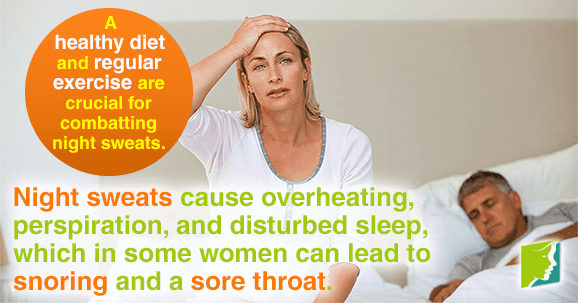Night sweats can be a symptom of menopause, or they could be a symptom of another underlying condition. Some research has been done on the connection between night sweats and snoring, but the results are inconclusive.
If you regularly have a sore throat when you wake up, you may have sleep apnea. This is when you stop and start breathing in your sleep. Sleep apnea is a potentially dangerous condition, so if you have any of the symptoms, you should consult your doctor.
What Are Night Sweats?
Night sweats, also known as "nocturnal hyperhidrosis", are episodes of sweating that occur at night, usually while the person is sleeping. Perspiration is a natural bodily function that helps to cool down the body, but people who have night sweats experience false temperature fluctuations that fool the body into believing it is overheating. The body then perspires in order to cool itself.
What Causes Night Sweats?
It is important to note that though menopausal hormonal imbalance commonly causes night sweats and other symptoms, there are other medical conditions that could be causing them. Menopausal night sweats are also not correlated to snoring and sore throat, so these symptoms may be due to another condition, such as a sleep disorder.
Medical conditions that cause night sweats include anxiety, sleep disorders, thyroid problems, HIV/AIDS, and some cancers. Any concerns should be discussed with your doctor. Medications can also cause night sweats, including antidepressants, drugs that interfere with hormone levels, and drugs that are taken to treat high blood sugar.
How Can I Deal with Night Sweats, Snoring, and Sore Throats?
Quick Fact:
Regularly waking up with a sore or dry throat may be a sign of sleep apnea.
It's important to see a doctor if a combination of night sweats, snoring, and sore throat are disrupting the quality of your sleep. Doctors can prescribe synthetic hormones to menopausal women, and this greatly helps to treat night sweats and other menopausal symptoms.
Snoring can be combated by losing weight and using nasal strips to help you breathe, and going to a doctor to talk about your snoring can provide you with more resources. Sore throats can be resolved by drinking water in the morning or something else to soothe the throat, but if they happen repeatedly, it is best to see a doctor.
Guidelines for dealing with night sweats include:
- Avoiding alcohol and caffeine before going to bed
- Abstaining from spicy food or any other food that triggers night sweats before bed
- Wearing pajamas and using bed sheets made from light and breathable fabrics
- Keeping a glass of cool water next to your bed
Recommendations
A combination of lifestyle adjustments and medication can usually help treat night sweats, sore throats, and snoring. However, it is important to see a doctor in order to rule out any underlying conditions. Click on the following link to read more about treatments for night sweats.
Sources
- Mayo Clinic Staff. (2014). Night Sweats.Retrieved September 23, 2015, from http://www.mayoclinic.org/symptoms/night-sweats/basics/causes/sym-20050768.
- Mayo Clinic Staff. (2015). Sleep Apnea. Retrieved September 23, 2015, from http://www.mayoclinic.org/diseases-conditions/sleep-apnea/basics/definition/con-20020286.
- Mold, J. W., Woolley, J. H. & Nagykaldi, Z. (2006). Associations Between Night Sweats and Other Sleep Disturbances: An OKPRN Study. Annals of Family Medicine, 4(5), 423-426.
- Mold, J.W., Goodrich, S. & Orr, W. (2008). Associations Between Subjective Night Sweats and Sleep Study Findings. Journal of the American board of family medicine, 21. Retrieved from http://www.jabfm.org/content/21/2/96.full.
- National Health Service UK. (2014). Snoring. Retrieved September 23, 2015, from http://www.nhs.uk/Conditions/Snoring/Pages/Symptoms.aspx.
- Stanford University. (1998). Sleep Hyperhidrosis (Night sweats, excessive sweating). Retrieved September 23, 2015, from http://web.stanford.edu/~dement/sweats.html.



